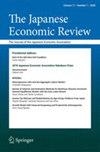儿童福利金与家庭财富积累
IF 1.5
4区 经济学
Q2 ECONOMICS
引用次数: 7
摘要
本文运用生命周期/永久收入假设,从理论和实证两方面评估了儿童福利金对家庭财富积累的影响。与模型的预测一致,我们发现较高的累积收益增加了流动资产,较高的未来收益支付降低了资产持有,并且这些影响在整个生命周期中系统地变化。正如模型所预测的那样,我们发现流动性受限和非流动性受限家庭对儿童福利支付的财富反应不同。本文章由计算机程序翻译,如有差异,请以英文原文为准。
Child Benefit Payments and Household Wealth Accumulation
Using the life-cycle/permanent income hypothesis, we theoretically and empirically assess the impact of child benefit payments on household wealth accumulation. Consistent with the predictions of the model, we find that higher cumulative benefits received increase current assets, higher future benefit payments lower asset holding, and that these effects systematically vary over the life cycle. We find different wealth responses to child benefit payments for liquidity constrained and unconstrained households, as predicted by the model.
求助全文
通过发布文献求助,成功后即可免费获取论文全文。
去求助
来源期刊

Japanese Economic Review
ECONOMICS-
CiteScore
2.70
自引率
0.00%
发文量
15
期刊介绍:
Started in 1950 by a group of leading Japanese economists under the title The Economic Studies Quarterly, the journal became the official publication of the Japanese Economic Association in 1959. As its successor, The Japanese Economic Review has become the Japanese counterpart of The American Economic Review, publishing substantial economic analysis of the highest quality across the whole field of economics from researchers both within and outside Japan. It also welcomes innovative and thought-provoking contributions with strong relevance to real economic issues, whether political, theoretical or policy-oriented.
 求助内容:
求助内容: 应助结果提醒方式:
应助结果提醒方式:


